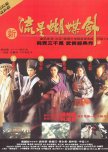
Uneven story with wildly over-the-top wuxia action
Butterfly and Sword was a bloody, high flying, star-studded, overly complex, mess of a movie. And entertaining in a way only an over-the-top wuxia starring Michelle Yeoh, Donnie Yen, and Tony Leung Chiu Wai could be.What was it about? Good question. I've watched it twice and it still has confusing elements. Every synopsis I read had a slightly different take on it. Lady Ko, Meng Sing Wan, and Yip Cheung have been together since they were street kids doing what they had to do to survive. All grown up, the three are assassins who often take well paid jobs from the eunuch. Lady Ko is the boss, motivated by gold and power. Sing is lovers with Butterfly, the daughter of a martial artist killed in battle. Sing pretends to not know any martial arts, telling her he has to go on business trips every once in a while. Yip also works for Ko and spends his spare time peeping on her when she’s bathing. It’s not really a love triangle, this is more like a love conga line. Yip loves Ko, Ko loves Sing, and Sing love Butterfly. When the eunuch sends Ko and her Happy Forest to take down the Elites Villa and retrieve a letter listing rebels, the blood begins to spew and body parts start flying.
Michelle Yeoh gave a nuanced performance of a deadly assassin who grieved her lost childhood and love. I wasn’t crazy about the jealousy trope for a strong woman, but she made it work. Donnie Yen was the love sick puppy lacking the courage to tell Ko he’d loved her since they were children. Tony Leung gave a lighthearted take on the assassin in love. I’m not familiar with Joey Wong, but her Butterfly was annoying. Despite all the strategizing, spying, betrayals, and gruesome fights, the story came to a screeching halt every time Butterfly came on screen.
The fight choreography was wildly excessive. Sing was able to launch himself like an arrow from a line in a tree or Ko’s body. Was the craziest technique I’ve seen in a wuxia, especially when he blew through people’s bodies. Nothing could withstand the characters’ abilities, not even buildings. Donnie and Michelle had a great fight scene in a bamboo forest that left most of their opponents skewered. It also showcased Michelle’s flexibility. Even though there were numerous gruesome decapitations by a variety of methods, they were fake enough to be more humorous than terrifying. There was even lethal soccer action! If you don’t like wire-fu, skip this one. Most scenes used wires and sped up action. Tony Ching put his imagination to good use developing the maniacal fight choreography.
Butterfly and Sword was not a great movie, but it was fun. The story was maddeningly disjointed and edited. Fortunately, Michelle Yeoh, Donnie Yen, and Tony Leung were in their prime and held nothing back. When scenes cut abruptly into a different one or the reason behind certain actions weren’t explained, it helped to keep an eye on the stars. This is a movie for fans of the genre and who don’t mind a film that isn’t polished and doesn’t take itself too seriously.
11 March 2024
Was this review helpful to you?
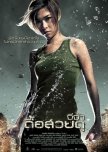
"My heart belongs to me"
Raging Phoenix starred Thai kicker Jeeja Yanin. The story was weak as was some of the acting, but those are not the priorities in this genre of movie. Did Jeeja kick, elbow, and pummel her enemies in style? Yes. Was the fight choreography as incredible as Chocolate? No. But most of the fights were entertaining.Brokenhearted Deu escapes from a kidnapping and is rescued by a stranger named Sanim. He battles fighters that wouldn’t have been out of place in a Road Warrior movie. Or a parkour street fight with razor prosthetics. His team is made up of three other fighters-Dogsh*t, Pigsh*t, and Bullsh*t. They’ve all lost women in their lives to the kidnappers and are resolved to bring the Jaguar gang down and rescue the surviving victims. The men practice Meyraiyuth, a form of drunken Muay Thai. Before you can say, “Wax on, wax off,” Deu is a proficient fighter. She’s willing to be used as bait to find the headquarters of the bad guys and where the women are being kept. Nothing goes that easy and they will all find themselves in considerable peril.
The story was thin and filled with man pain tropes. Jeeja Yanin had enough acting ability for what the role called for and there’s something about her that is likeable. Kazu Tang who was usually employed as a stuntman or fight choreographer was fine as the determined Sanim and object of Deu’s unrequited love. The Poop Brothers weren’t very strong actors but conveyed enough meaning to keep the story going. Though their first thirty minutes was filled with slapstick comedy that five-year-olds would appreciate.
The fights were well choreographed and the wire-work, for the most part, blended in. There was plenty of action that didn’t require any special effects help. Jeeja and Kazu were fun to watch as they kicked, bounced, and spun. Both were quick and athletic. The fight between Jeeja and Roongtawan Jindasing’s evil Jaguar had some moves that appeared all too real and bone crushing. The Poop Brothers’ style came across as a combination of Meyraiyuth and break dancing. I’ve never seen a fighting style that required spinning on one’s head! Raging Phoenix wouldn’t win any awards for the CGI backdrops to the fights, they were pretty bad. For a lower budget film, I didn’t mind.
If you are looking for a coherent and tightly written story, this won’t be it. If you are looking for superb acting, best to pass. If you enjoy high flying, flipping, crushing knee kicks and elbow hits and kickass women fighting, this might be the ticket.
11 March 2024
Was this review helpful to you?
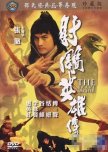
"I'm going to get revenge, I hope I see you later!"
The Brave Archer was Chang Cheh’s take on Legend of the Condors. This movie was the first of four following Kuo Tsing’s adventures. Chang was known for ushering in the more machismo and bloody era of kung fu so this film focusing on a romance was a rare departure for him.This film moved hard and fast through the source material. It had the longest intro of any kung fu movie I’ve ever seen. Not only did it have the typical narration explaining the basic historical setting but also the different characters and which group they belonged to during the opening on a stage. As someone who has not read the book it was my first clue that this two-hour film was going to be packed with characters with little time to develop.
The story began with the classic tale of two babies separated and trained by different people, babies who were born to be blood brothers but who ended up on opposite sides. Alexander Fu Sheng played the “clumsy, slow” but good-hearted Kuo Tsing who was trained by the 7 Weirds. He runs afoul of the deadly Iron Corpse Mui Chiu Fung. Later he befriends Huang Yung dressed as a boy with romance soon to blossom. There were not one, but two battles for marriage scenarios, someone came back from the dead, a large snake played a role in Kuo’s development as did two other masters he made the acquaintance of.
Famous kung fu faces passed by in nearly every scene. Alexander Fu Sheng played a perfect not too bright hero. Tien Niu as Huang was a fiery companion for him. Five actors from the Five Deadly Venoms had special appearances. Ku Feng made for an entertaining 9 Fingered Beggar, and one of my favorites to see. Johnny Wang in silver lamé looked every inch a bad guy. Kara Hui had a short, but important role along with Dick Wei. Yu Hoi Lun played the female fighter so fierce with her lethal Skeleton Claw technique that most of the men in her path ran away. There were four female warriors and not a bare breast in sight, just competent women.
The fights were unimpressive. Most of them were kung fu posing and not very fast. At least Ku Feng knew how to keep them interesting with his acting. Yu Hoi Lun scared her opponents with her fierceness rather than lightning speed. Philip Kwok showed off his athleticism with his slightly mad master in an awful wig. Shaw Brothers didn’t scrimp on the sets where all the action took place, including Peach Blossom Island.
If you’ve watched one of the dramas based on Jin Yong’s books or read the books themselves, this will likely look like a highlight reel. If you don’t have any experience with either, like me, the characters are tough to keep up with. I had to make a cheat sheet to remember the different characters and factions involved as the action moved quickly from one group to another and then suddenly came to a dead stop. For a 1977 Shaw Brothers movie it looked good and for a Chang Cheh 1970’s kung fu film it was a more well-rounded story than many of his were.
10 March 2024
Was this review helpful to you?
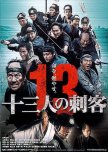
"Betting on yourself is true gambling"
13 Assassins managed to transcend the average samurai film not only with the political maneuverings but with a final hour that was explosive and thrilling. Two men on opposite sides had to decide if samurais serve their master or the people. The answer would be written in blood.Doi Toshitsura, the Shogun’s senior advisor, is appalled at the atrocities committed by Lord Naritsuga against noble families and commoners alike. Rape, torture, murder, dismemberments—everyone was a plaything to him. The Shogun refused to have him step down fearing chaos while Doi recognized that the vengeful clans would likely revolt when Naritsuga joined the Shogun counsel. Doi needs a solution and his turns out to be Shimada Shinzaemon, a retired samurai who worked under the previous Shogun. Shinza’s eyes light up when given the chance to help the people and die a glorious death. Shinza puts together a team of 12 samurai, “nobodies” who have no titles, families, or affiliations. His goal is to kill the Caligula of Japan on the lord’s annual trip home. Shinza’s old school buddy who works for Naritsuga stands in his way. Cunning and connected, Hanbei will prove a clever foil to Shinza’s plans.
The first hour or so of the film saw the reasons for the team and the team pulling together and training. “There’s no fair play in battle!” On the way to their destination, Shinza’s group picks up an unlikely ally that resembled Toshiro Mifune’s mad samurai in The Seven Samurai. The final 45 minutes of the film showed Shinza’s and director Miike Takashi’s genius. I’ve watched a lot of action films and never have I seen the element they used to great effect in this film. As expected, there were buckets and buckets of blood spilled but for the most part it never turned truly gory. The battle was brutal, with Samurais utilizing whatever weapons were nearby.
Yakusho Koji as Shinzaemon was perfect. He conveyed the warrior’s desire to return to battle, his horror at the cruel lord’s actions, patience when a strategy called for waiting, and humor even in the face of death. And above all, he displayed the sense of honor a samurai should have, not only for the Shogun, but also for the people. Most of the other 11 samurai were difficult to discern between. I was able to familiarize myself with about six of them. I wish they’d spent more time developing them. Inagaki Goro gave Naritsuga a mad emperor vibe that only grew stronger as the blood began to flow. The cinematography encompassed not only the towns and interiors, but the dense Japanese mountains the samurais had to trek through. Some of the shots were breathtaking.
13 Assassins maintained the tension of Samurais going against the code in order to murder the second man in charge for a greater good. Not one of the 13, well, maybe one, thought they would walk away alive and all were ready to die for their cause. The last 45 minutes was utterly thrilling with the explosive action and wondering if the 13 would succeed and if any of them would survive. If you enjoy samurai films, you’ll find few better than this one.
9 March 2024
Was this review helpful to you?
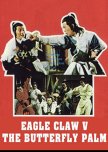
Butterflies deserved better
Eagle’s Claws & the Butterfly Palm was a deeply disappointing kung fu flick. The only thing it had going for it were spinning butterfly shields with spikes on them. Who knew butterflies could be so deadly?The defeated Mongol king along with his son and daughter are plotting how to return to power. In the opening minutes, the Mongol king wearing his lemur tails hat is assassinated, leaving the siblings in charge. The princess has magic powers and can control people with a secret butterfly potion and her flute. The last of the clans work together to bring down the deadly duo but become ensnared in the Butterfly clan’s plots. Three heroes-Mao, Eagle, and Lung plan to bring the Butterfly clan and Mongol princess down, but spend most of their time either in an abandoned temple or wandering around. Things are not looking up for the good guys.
When someone asked, “Who’s there?” when he entered a room, the answer should have been, “Who knows, it’s so d*mn dark in here!” Most of the fight scenes were filmed in the dark making it almost impossible to follow the action. Perhaps it was by design as the fight choreography was quite poor illustrated in the few well lit fights. Even with all the kung fu posing, many of the hits and kicks missed by a mile. Lo Lieh did a twist on his red hands from King Boxer, only this time with the butterfly palm. The sword work was also rudimentary, though the creative stuntmen tried to jazz it up with flipping over multiple railings or doing creative falls. The producers must have gotten a deal on buying trampolines in bulk. Characters leaped across the country and even rooms like giant bullfrogs.
The female lead known only as Lung’s daughter was extremely annoying both from the writing and acting. Everyone else seemed to be going through the motions as if they realized this film was a real stinker. Lo Lieh can usually perk up any movie, but looked like he wanted to fire his agent for getting him involved in the movie. Tsung Hua, Yu Tien Lung, Nancy Lau, Sun Chia Lin, and Lee Kwan were the only actors with significant lines, everyone else seemed to be a guest role. Maybe the others negotiated ways to stay off the screen for professional preservation. The story barely made sense and tried to use double crosses, secret identities, mind control, and treachery to spice things up. It didn’t help. Characters hopscotched around without any real purpose. A bad high school play would have been a step-up from this movie.
I normally save low scores like I gave this one for movies who delve into sexual exploitation. This film was just ridiculously bad. Bad script. Bad fights. Bad acting. Bad lighting. And lastly, hilariously bad costumes. I can even handle bad if the movie entertains me. Eagle’s Claws & the Butterfly Palm never took flight.
8 March 2024
Was this review helpful to you?
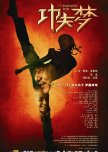
"The best fights are the ones we avoid"
How you feel about The Karate Kid remake may largely depend on how old you were when you first watched it and how old you were when you watched the original. Despite the title, in the remake they practiced kung fu, not karate, and Xiao Dre was quite a bit younger than Daniel-san had been. Other than those elements and the Chinese travelogue inserted, the basic storyline was the same.Twelve-year-old Dre has to leave everything behind when his mom is transferred to Beijing, China. While his mom looks at it as an opportunity, Dre feels left adrift. On his first day in his new home, he runs afoul of the local kung fu bullies and is beaten. He also meets sweet Mei Ying who is a classmate and violinist. After the maintenance man saves him during a vicious beating, the story is set up for Mr. Han to train Dre in kung fu.
Jaden Smith’s size made him a perfect target for bullies and it was easy to see why Dre would be afraid of Cheng and the pack he ran with. The Kick Them in the Dragon Balls School of Kung Fu mantra of “No Weakness! No Pain! No Mercy!” didn’t leave a lot of room for negotiation, especially with its abusive and sadistic master. Taraji P. Henson was gorgeous and tenacious as the over-protective mom. Jackie Chan gave a subdued performance as the mentor, Mr. Han. He only had one fight and it was with the prepubescent bullies. The kids who played Cheng and Mei Ying were adequate.
The cinematography and scenery were beautiful. There were trips to the Forbidden City, a kung fu monastery on a mountaintop, and training on the Great Wall of China. I suspect the last one is a big no-no in real life. The strange new home upped the ante on the fish out of water trope, especially when Dre didn’t speak any Mandarin. The travelogue elements while stunning, also hampered the movie as the pace was already doggedly slow. No kung fu movie needs to be 2 ½ hours long. There was also the change to the kids’ ages that I found troubling. In the original, Daniel, Ali, and Johnny, were on the verge of becoming adults. They were high schoolers where the romance seemed more natural and the fighting more acceptable. In the 2010 Karate Kid, these were 12-year-olds beating each other senseless. No wonder Mei Ying’s parents didn’t want her seeing Dre.
The original film wasn’t great but it was a touchstone for kids during that simpler time period just as this one may have been for its generation. Both Karate Kids showed that there are jerks and good people everywhere. Xiao Dre learned to show respect for his mom, his sifu, his new home, and himself. He also discovered that success required focus and dedication. The 2010 film was a fine addition to the Karate Kid family, if only they’d changed the name to correctly reflect the skill being taught. RIP Mr. Miyagi. No one can take your place in my heart.
8 March 2024
Was this review helpful to you?
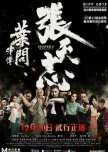
Cheung Tin Chi had been working for Yuen Wah and Tony Jaa as muscle for hire with a code. He earned enough money to open a small store under his apartment. Fate puts him in the path of Julia and Nana who are running away from Tso Sai Kit who runs the local opium den. Cheung protects the women but makes an enemy of Kit. Soon he will be working with Julia’s brother Fu who has a bar that caters to Westerners. He also comes into contact with Kit’s sister who is trying to convert their gang into a legitimate business and Owen Davidson, a giant of a man who runs an upscale restaurant and is a philanthropic businessman or so he would have people believe. Soon Cheung is in a battle for not only the lives but the souls of the people on Bar Street.
Master Z was a by-the-comic-book interpretation of history. Bar Street was pristine and gleaming, far too perfect looking. Cheung’s son even idolized Black Belt/Batman. The villain was bald, white, and enormous, similar to Daredevil’s Kingpin. You know he was a villain because he ate steak which is code for barbaric, I guess. Michelle Yeoh’s complicated Triad boss showed that the Chinese can clean up their own messes when she disarmed her drug dealing brother. But it would take a team effort to defeat the foreigners. The dialogue could be heavy handed and some of the supporting characters weren’t very strong actors but fortunately, Zhang Jin was captivating to watch even if his character was thinly drawn. Michelle Yeoh added some movie star cred to the cast and gravitas to her elegantly lethal character.
Since this was an Ip Man spinoff I expected good fights. Some of them were. Zhang Jin actually practices martial arts so that’s usually a good start. Yuen Woo Ping had to dip back into his Shaw Brothers days and bring out the wires. I don’t mind a little wire-fu, but it has to flow naturally. In a street fight as Cheung and the bad guys flew up and down the buildings awkwardly, all I could think about was the epic building fight from Chocolate (2008) with Jeeja Yanin sans wires. Much of the wire work in Z was not orchestrated well. To quote another superhero, “Jarvis, just skip the spinning rims.” Dave Bautista beating a good guy like he was using a paddle ball was another over the top stunt but showed the big man was a super bad guy. Zhang Jin was fun to watch and his moves were smooth, confident, and fast. And I will never tire of Michelle Yeoh being a badass whether hand-to-hand or with a sword. I wish Tony Jaa had been able to cut loose, but this wasn’t his movie. Kung fu movie alum Yuen Wah made a welcome guest appearance. They had plenty of veterans on screen and the excellent Yuen Shun Yi choreographing the fights. Most were well done except when they completely defied gravity in less than fluid manners.
Master Z was entertaining even when it lacked nuance. Cheung Tin Chi and his new Bar Street family made a competent addition to the Ip Man series. The grand fight between good and evil when Cheung finally regained his mojo was what kung fu and superhero movies are made for, especially when the people bond together around the hero to take back their town.
7 March 2024
Was this review helpful to you?

"You have a lot of courage to show up here!"
The Vengeful Beauty was a surprisingly entertaining martial arts film from 1978. Shaw Brothers movies could go either way during this time frame. Chen Ping more than held her own with the boys—Lo Lieh, Yueh Hua, Norman Chu, and Johnny Wang. Her character was pregnant and she still suffered no fools with a sword!Emperor Yong Zheng pretended to be a friend to the people all the while he was having ethical officials executed by the Flying Guillotines. And in a clear sign of tyranny, he orchestrated book burnings and the executions of anyone who wrote anything remotely critical about the imperial court. Rong Qiu Yan’s husband ran afoul of the emperor and while she was away honoring her deceased martial arts master with her junior, Wang Jun, Jin Gang Feng sent the Flying Guillotines to her house and eliminated everyone. On the run to protect the child she was carrying she came across Ma Sen working at an inn. Brother Ma was also on the run as he had been a Flying Guillotine but could no longer stomach the murder of innocents. He joined her as well as Wang Jun when Jin sent his lethal children after them.
Qiu Yan was smart and could take care of herself. Chen Ping brought a nice depth of emotion to the vengeful and pregnant heroine battling assassins. After one bit part in the original Guillotine film and his scenes cut in the second, it was good to see Norman Chu in a leading role as an ex-Flying Guillotine. He had to endure an atrocious wig in order to do it though. I almost didn’t recognize him because he looked so young—no wonder, he was only 23 at the time! Lo Lieh in a gray wig played the leader of the Flying Guillotines. He gave a strong performance as a father whose children were eliminated one by one.
The sword fighting was average for the time frame, a lot of swipe and falls, but still fun to watch. The flying guillotine, one of the strangest of kung fu weapons, made a couple of appearances in this a loose sequel. There was some wire work and reverse filming, nothing over the top and edited fairly seamlessly into the fight scenes. One fight included a topless Susan Yam Yam Shaw which weirdly didn’t feel too gratuitous. There was also a battle high in the bamboo long before Crouching Tiger, Hidden Dragon and The House of Flying Daggers.
The Vengeful Beauty benefited from a well written story by Szeto On. There was no shortage of vengeance and deaths, yet this story didn’t feel like it was hastily sewn together with tropes from a hundred other kung fu films. Most importantly to me, Szeto let the heroine struggle and shine. Qiu Yan was fierce and vulnerable. Kung fu movies would soon be taken over by mostly male casts, so every competent female warrior feels like finding a gem.
7 March 2024
Was this review helpful to you?
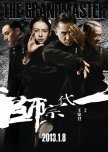
Horizontal or Vertical?
I watched The Grandmaster years ago and while I thought it was visually stunning, the story left me wanting. After watching several Wong Kar Wai films recently, I decided to revisit it and see if my perspective changed.In 1936 Foshan, China, Grandmaster Gong Yu Tian is coming to town to pass the torch to a new Grandmaster. The consensus is that Ip Man would be a good choice but he will have to face Yu Tian. Yu Tian’s daughter, Gong Er and Ip Man eventually spar and a connection is made despite the fact that Ip Man is married and has children. Who is Grandmaster and who is horny for whom becomes irrelevant as the Japanese invade the country. Ip Man loses his home and his fortune as he and his family face poverty and starvation with much of the rest of the people. Because he belonged to the wrong political party after the war, he moves to Hong Kong around 1950. He will once again run into Gong Er, but her life has taken a drastic change.
As with the first time I saw this film, the cinematography was gorgeous and lush. Beautiful people in beautiful costumes filled the screen. Smoke from cigarettes or trains wafted and circled about as if alive. Snow and steam formed the perfect backdrop for a cataclysmic fight. As did rain and puddles when Ip Man fought a dozen men at the beginning of the film. Music as much as the standard Wong Kar Wai dark palette of green, yellow, and shocks of red set the mood.
The fights were entertaining, but more stylistic than realistic. Forced close-ups and slow motion made the fights more dance than danger, even when people were thrown through windows. Many times I wished they could move the camera back to show more of the full body motions, but with actors who are not martial artists that likely wasn’t possible. I was happy to see old school kung fu actors like Lo Meng and Lau Kar Yung make brief appearances. And I could have used much more of The Razor played by Chang Chen.
Tony Leung Chiu Wai was an elegant Ip Man, but it was hard to connect to the character with the uneven storytelling. He was also a man with a wife and children longing for another woman. Song Hye Kyo as Ip Man’s wife was mostly an afterthought. She had scarcely any lines. The romance was focused on Gong Er as was much of the film. Zhang Zi Yi gave a good performance as the daughter who vowed to return the family’s honor even if it meant her death. Another issue I had were the relentless voiceovers and intertitles, they completely broke the rhythm and mood for me, distancing me from the characters.
The Grandmaster was a striking film to look at but not as much fun to watch as the story often stumbled. And aside from the fight at the train station, much of it will fade from memory as it did the first time because there was little substance to cling to.
6 March 2024
Was this review helpful to you?
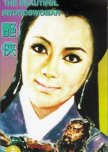
Yuan Yuan trains in secret and receives her assassin assignments from her old sifu. She and her governess disguise themselves in a myriad of ways, even as a new bride, in order to take down her targets. Her doting father never suspects his docile and obedient daughter has another side to her. Before long her secret life and her family life converge when she learns a devastating secret about her “father”.
The sword fights were pretty good for the time although there were a lot of swipe and falls. Yuan Yuan wasn’t afraid to aim for the face. Her nemesis used rings to kill his enemies. Wang Ling gave a strong performance as Yuan Yuan keeping the overacting so common in the 60’s to a minimum. Ma Chi played the loving father to the hilt and also the creepy murdering rapist.
There were some exciting fights early in the film and then it began to be dragged down in melodrama. The end was encumbered by the diametrically opposed familial cry for revenge and the punishment for killing a parent. Yuan Yuan was burdened with forgiving the unforgiveable and also settling her parents’ blood debt which seemed impossible. Family dynamics can be tricky.
6 March 2024
Was this review helpful to you?

Stellar cast let down by mediocre writing and even worse special effects
Flying Swords of Dragon Gate was a remake of a remake. After watching it, I’m pretty convinced that was at least one remake too many. In lieu of quality martial arts fights, Tsui Hark buried the film in bad CGI and mediocre storytelling.It’s the Ming Dynasty which means the evil eunuchs are running amok. Zhao Huaian and his spunky rebels seek to take down the eunuchs and rescue the falsely accused. At the same time, a maid who was unfortunate enough to get impregnated by the emperor is on the run. Fear not! Eunuch Yu the head of the diabolical Western Bureau vows to have her hunted down and killed. A keen multi-tasker he is also determined to be rid of Zhao. The annoying maid is rescued by a female swordswoman and escorted to the Dragon Gate Inn in order to avoid a deadly sandstorm. The inn becomes overly crowded with a group of rowdy Tartars, Eunuch Yu’s men, and a dead ringer for Yu named Wind Blade. Eventually, Zhao shows up as well because the inn in the middle of nowhere is a magnet for killers and heroes alike. Everyone has their reason for being there and hidden treasure buried in the desert makes strange bedfellows with unlikely alliances.
This movie was 2 hours long but felt closer to 2 days. With the exception of the female Tartar warrior, none of the characters were particularly engaging. Aside from Burudu, I didn’t really care if any of them walked away from the inn where you did NOT want to be served “white” meat. Chen Kun played dual roles, but even he couldn’t save the lackluster writing. Jet Li acted bored as well. On the positive side the film had four accomplished female fighters. I was also happy to see old school kung fu movie star Gordon Liu in a guest role as one of the power hungry eunuchs brief as it was.
The film lacked character development and urgency for a story set in the only dwelling on the edge of nowhere filled with people wanting to kill each other. What could have been a tense claustrophobic thriller dragged on relentlessly with very little movement. The eunuch’s doppelgänger element was talked about more than used effectively. The romance clumsily wedged into the story was feeble at best. Five black sand tornadoes did little to liven things up.
Aside from the uninspired storytelling, what ruined this film for me was the terrible, and I mean atrocious CGI. The fights were ridiculously bad and completely reliant on CGI and green screens. The green screens were obvious as well. Nothing appeared real including the CGI actors that often bounced around. The sped up fake and real people fighting moved awkwardly instead of fluidly. Jet Li and Chen Kun’s fight in a tornado hurt my eyes there were so many bad effects going on. I kept expecting to see the woman riding her bike in the twister from The Wizard of Oz blow by. That’s not even taking into effect how fights were sped up and characters were thrown like paper airplanes. Most Wuxias in actual historical settings have some actions grounded in reality. People had limitless daggers stashed away in their sleeves. How their sleeves weren’t dragging the ground, I’ll never understand. Originally filmed for 3D, many of those daggers were hurled straight at the screen.
I enjoyed King Hu’s 1967 original Dragon Gate Inn no matter that the sword fights were primitive by today’s standards. At least they weren’t blurred and sped up to a ridiculous rate. I am a fan of Jet Li, Chen Kun, and Zhou Xun and I really wanted to like this film. The film ran too long, was narratively a mess, and relied too heavily on special effects instead of quality fight choreography. Flying Swords of Dragon Gate deserved to be buried in the sand.
5 March 2024
Was this review helpful to you?
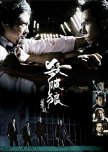
"You don't have anyone to fight with anymore"
In SPL: Sha Po Lang aka Kill Zone it didn’t matter what their star was everyone suffered painfully. Those three troubling stars---power, destruction, lust---there was very little lust but an awful lot of destruction for the cops and robbers in Hong Kong on a fateful Father’s Day.Inspector Chan is aboard a vehicle with a witness and his family. The vehicle is attacked and the witness is killed leaving a young daughter behind. With no witness, the notorious criminal Wong Po is released from jail. When the surgeon removes a large shard of glass from Chan’s head, he discovers a tumor. Chan adopts the witness’ daughter and spends the next three years with his team trying to bring down Wong Po. As the clock ticks down on his life, Chan prepares to retire. The conscientious Inspector Ma comes on board to take his place. It doesn’t take long for Ma to realize that Wong Po isn’t the only one engaging in illegal activities.
Director Wilson Yip and fight choreographer Donnie Yen attempted to turn back the clock in this Triad film by using a minimum of wires and undercranking. With the casting of Donnie, Sammo Hung, and Wu Jing, the expectation was for spectacular fights. There were a couple of small skirmishes near the beginning, but you will have to wait until the last twenty minutes or so to be rewarded for sitting through the corruption, murders, and hand wringing on Father’s Day. The fight between Donnie Yen and Wu Jing was unbelievably fast and vicious. The last fight on the docket was Donnie vs Sammo. This fight included more grappling and was brutal and punishing. Donnie may have been 42 but Sammo was 53 and showed he could still bring it! Donnie’s Inspector Ma learned why one of the main rules in fighting is---Never turn your back on your enemy! Another character learned the tsunami lesson, if all the bad guys are running away it means there is either a Balrog loose from Middle Earth or a very scary bad guy is headed your way. Run!
Most of the action took place on Father’s Day prior to 1997. As a father or child, every character had an issue. The story was melodramatic, nihilistic, and just a big Debbie Downer. The acting was excellent for the most part. Simon Yam made a great weary Inspector Chan. Sammo brought a bit of humanity as a father and husband to his ruthless Triad boss. He also didn’t overact and make the character cartoonish as so often happens with martial arts villains. Donnie played low key as he often did, turning on the energy when the fights began.
Sha Po Lang wasn’t a great movie and the script felt like a retread of better crime films. Infernal Affairs it wasn’t. The saving grace was that the final two fights were memorable, enough to bump my rating up. There’s an old saying that “crime doesn’t pay” but it does pay back. Character after character was sliced to bits. I had to watch through my fingers on a couple of fights. Everyone seemed to be in the Kill Zone.
5 March 2024
Was this review helpful to you?
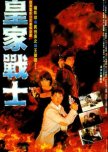
Michelle Yeoh and non-stop action!
In the Line of Duty: Royal Warriors showcased Michelle Yeoh’s rising star power. Only twenty-four at the time she had no problem carrying this film. Sanada Hiroyuki joined her making for an appealing and high kicking duo!Flying home to Hong Kong, Officer Michelle Yip and retiring Interpol agent Yamamoto become involved in a high jacking. Air Marshall Michael Wong is along for the ride as well. After defeating the two criminals, they are hailed heroes. What they don’t realize is that the now deceased “Tiger” has buddies who are seeking vengeance. From there family members are murdered, a break neck car chase takes place, later a shootout in a nightclub raises the body count, and finally an explosive battle determines who will live and who will die.
Royal Warriors was a quintessentially 1980’s cop film. It was ultra-violent, there were numerous explosions, it had a destructive high speed car chase, and a shootout in a nightclub with flying glass and bodies everywhere. You did not want to be the loved one of a cop in this era because the odds of you making it out alive were zero to none. And the nostalgia factor also shown through for me. There was a poster for my favorite movie, LadyHawke, in the background. Items you don’t see anymore like audio cassettes, boom boxes, video tapes, phone booths, and cell phones that resembled WWII walkie-talkies made their appearances.
The complex fights were no problem for Michelle Yeoh as she was athletic, fast, and agile making the moves look natural. She was in great form in this film. Sanada Hiroyuki was also able to deliver fists and kicks believably. Mang Hoi’s choreography made for thrilling fights as the two officers battled the different bad guys in deadly confrontations. No two fights were alike and the stars of this film were exciting to watch. One fight even included a chainsaw and another, a coffin! There was also plenty of gunplay for those who prefer their violence to be packed with not just punches but high-speed lead.
Lam Wai and Michael Chan conveyed their villains in quiet deadly fashion. Pai Ying preferred to chew the scenery with his maniacal “Bandana”. As I mentioned, Michelle and Hiroyuki played their roles quite well. Michael Wong’s Michael seemed out of place. Everyone else was in a brutally violent film and he acted like he was in a romantic comedy. The character seemed badly out of place. I suppose the writers felt the need for some humor in the dark and deadly film, but Michael came across as annoying instead of funny. The attempt at a romance also failed.
Though the technology and ultra-violent deaths for civilians date it, the movie largely holds up today. The action was nearly constant and well choreographed making for an entertaining movie. The writers did Michelle a solid and didn’t make her have to be rescued or have the male lead take down the bad guy in the end as so many films have done with strong female leads. There were no histrionics, just a powerful woman doing her job and taking out the trash. Michelle Yeoh shone brightly and would develop her screen persona even more after this film. If you like martial arts films, 1980’s crime films, or the girls with guns genre, this is one try.
4 March 2024
Was this review helpful to you?

"My sword is getting thirsty"
The Swift Shaolin Boxer, even by 1970’s Taiwanese kung fu standards, was completely bonkers. There were triple crosses, maybe quadruple, I lost count somewhere along the line. And for around 45 minutes I had no idea what was going on and who were the good guys and the bad guys and why it all mattered. The fights were fun though and used a variety of styles, weapons, and accoutrements.Angela Mao worked at an inn that was the headquarters for the bad guys. The translation said rebels, but the rebels were usually the good guys, right? Not when Lo Lieh was the leader and ordering people to be murdered. Whatever their game plan was and it was never disclosed, they were the baddies. The good guys sent Hsieh Hsing and later Wang Kuan Hsiung with letters or lists, something that people were willing to kill for. Ultimately, Barry Chan showed up twenty-five minutes into the movie in a field of flags and began dueling with people. He faced people using swords, staffs, a giant, and kung fu fighting, finally facing Chia Ling. After winning the contest he was allowed to work for the emperor and off to Angela’s inn he goes. Was Angela a bad guy? Was Barry a good guy? The bad guys were terrible at communicating to each other who was on their team because they kept fighting each other.
The fights for the time and place were actually pretty good and for the most part avoided kung fu posing although there were way too many misses. The choreography was over the top though----lots of wire fu, trampoline bouncing, gymnastics, reverse shots, and undercranking. Several people fought in an umbrella labyrinth. Why was there an umbrella labyrinth in the middle of nowhere? Who knows? Not only did the grown-ups fight, but when Wang went into a secret monastic lair in a mountain he had to fight child monks wearing gold sequined outfits with special abilities. Why were their child monks? Who knows? One of my favorite tropes-hopping vampires made an appearance and got the chance to fight, too. There was also a killer flute. Music so bad it kills!
The story became more convoluted and hilarious by the minute, fortunately the fights kept coming. I’m always happy to see Angela Mao and her fierce gaze and quick feet. Barry Chan may not have been the strongest fighter but he acquitted himself well in this movie. And Lo Lieh made every kung fu movie better by being on screen even when he was relegated to only a few minutes at the beginning and then at the end. Did I ever figure out what all the fighting was about? To quote one character, “Who knows?”
4 March 2024
Was this review helpful to you?
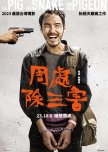
"One mistake can lead to irreversible regret"
The Pig, the Snake, and the Pigeon was a tough film to rate and harder to review. The film showed how different people react when death stares them in the eye. Do you attempt to mend your ways or seek a lasting legacy no matter how reprehensible?Chen Kui Lin aka the Kuilin Kid made a name for himself by taking out not one, but two mob bosses. While lying low he discovers from a pharmacist who treats gangsters that he has stage 4 lung cancer. She works to convince him to do the right thing and turn himself in. After praying to General Guan and tossing the divination sticks nine times he goes to the police station to do just that. Problem being that an armored car had turned over and people were lined up to turn in the money they’d pilfered. While waiting he sees a wanted poster with the top three fugitives. He was ranked #3. At that moment he determines to take out the top two to improve his legacy.
The first half of the film had numerous brutal, no holds barred fights between Kui Lin and the cop Chen Hui and between Kui Lin and Hongkie. Hongkie was vile, a rapist, and deadly. No tears shed for anything bad happening to him. The second half of the film delved into the spiritual side and repentance. Even a killer like Kui Lin could grasp at the thread of hope. At least before the violence erupted into new disturbing levels.
I’ve never been an Ethan Juan fan but I have to admit he did an admirable job as the killer who could murder people easily but could also be quite affable and charming. He rescued at least two people and tried to save a third. That didn’t mean he was a good guy and it would be wrong to idolize him. His last violent act disturbed me greatly and threw me into a moral quandary attempting to understand his reasoning.* The final twist wasn’t much of a twist and in the end, it didn’t matter, at least to Kui Lin.
The Pig, the Snake, and the Pigeon had high production values and well shot fight scenes. The acting was quite good and Ethan Juan made it hard to not feel some empathy for his character. The story could be uneven and the final third of the film took too long to resolve. Far from glorifying the gangster lifestyle, it showed that three evils no matter how fair or repugnant they might appear to be needed to be vanquished. Interestingly, only one facing death had the courage to do something unorthodox to rid society of the animalistic ills.
3 March 2024
***********Spoiler below**********
********************************
The only way I could resolve the massacre at the cult was that after all the evil they had done including murder and destroying at least one child’s future, he thought they would continue their wicked ways . Many of the people in the cult who did not heed his warning knew it was a scam and were enforcers and the others who stayed behind were either in on it or so brainwashed that would continue to drive people to suicide or murder when ordered. The ambiguity of the ones left behind who were killed was very distressing to me and why I didn’t rate this film higher.
In the end, Kui Lin paid for his crimes and the pharmacist who got her three birds, actually a whole flock, with one stone was also facing a painful death herself.
Was this review helpful to you?

 31
31 98
98 7
7





















